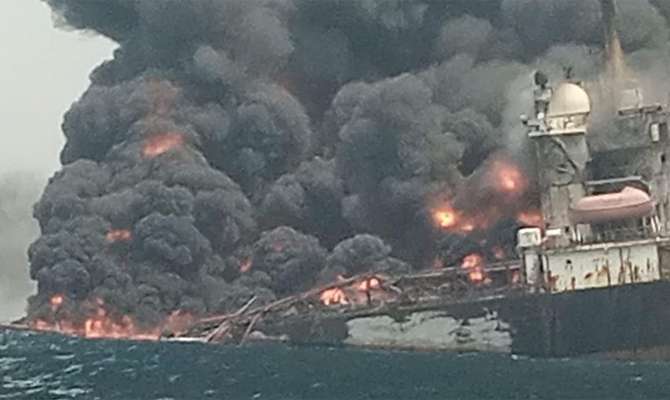Three crew members on board an oil vessel that exploded last week off the coast of Nigeria have been found alive, while seven have still not been found, according to Shebah Exploration & Production Company Ltd.
The chief executive officer of the company, Ikemefuna Okafor said in a statement, that it would ensure all survivors are given appropriate medical attention.
Okafor indicated that “one dead body was discovered in the vicinity” but the identity of the dead body was not immediately verifiable as a crew member.
“The identity of the dead body is yet to be ascertained,” Okafor said. Actions taken so far to locate the remaining crew members, “clean up and limit damage to the environment, and establish the cause of the explosion” were ongoing, he added.
The Floating Production, Storage and Offloading (FPSO) vessel, Trinity Spirit with a storage capacity of about 2 million barrels of oil, and can process up to 22,000 barrels per day caught fire following an explosion on Wednesday, February 2, 2022.
The number of barrels stored in the vessel at the time of the explosion is still unknown, but the incident has raised fears of a major oil spill.

Since the incident occurred, the Nigerian government has announced that it is considering the possibility of a merger with the United States to create a new company to take over the management of the oil tanker, the company said.
Mr. Okafor said: “Our joint efforts are aimed at establishing the location, safety and security of the seven crew members still missing, cleaning up and limiting environmental damage and establishing the cause of the explosion”.
No Spill Incident
Idris Musa of the country’s spill detection agency NOSDRA, told the AFP news agency on Sunday, February 6, 2022, that “no spill incident” had taken place “other than emulsified oil in small quantity”.
An eyewitness report indicated that remains of the Trinity Spirit, broke into two and partially submerged, but said there was no evidence of spilt crude. However, Environmental activists have expressed concern about the potential impact.
“There will definitely be a spill,” said Mike Karikpo, of the local NGO Environmental Rights Action/Friends of the Earth Nigeria.
Eric Omare, executive director of Niger Delta Good Governance and Environmental Initiative, said high tidal waves could have washed away the oil and that the full impact would be felt soon.
Some sources and an environmental group told Reuters the oil vessel had been in precarious conditions. A trading source who used to occasionally store oil on Trinity Spirit described it as “old and badly maintained” and said they have halted use of it because of “too many technical issues”.
“Most, if not all of the big trading companies stopped using it several years ago,” the source said.
Nnimmo Bassey, from Health of Mother Foundation, said the vessel had been in operation for more than 30 years, outliving its lifespan of 20 years, and should have been decommissioned.
Oil spills are common in Nigeria but usually affect the Niger River and its tributaries, and more rarely the sea. The region continues to face debilitating consequences of oil spills, which has eroded livelihoods and deprived residents of basic essentials such as access to clean drinking water.



















